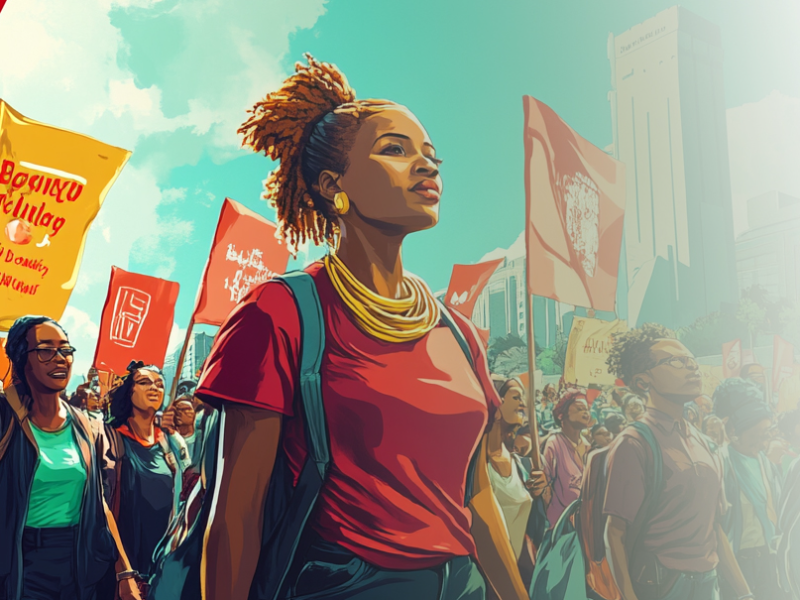Celebrating National Women’s Day in South Africa
A Perfect Opening to Celebrate the Birth of IAEOZ Summit 2024 Africa
National Women's Day in South Africa, observed annually on August 9, commemorates a pivotal moment in the nation's history. On this day in 1956, over 20,000 women of all races marched to the Union Buildings in Pretoria to protest against the apartheid government's pass laws. This event is not just a reminder of the past struggles for equality but a call to action for continued efforts towards gender parity and equal rights.
Historical Significance and Legacy
The march on August 9, 1956, was a landmark event in the fight against apartheid. Women from diverse backgrounds united to demand an end to the discriminatory pass laws, which severely restricted the movements of black South Africans. Led by prominent figures like Lilian Ngoyi, Helen Joseph, Rahima Moosa, and Sophia Williams-De Bruyn, the protest was a testament to the strength and resilience of South African women. Their chant, "Wathint' Abafazi, Wathint' Imbokodo!" ("You strike a woman, you strike a rock!"), has since become a symbol of women's resistance and empowerment.
Modern Day Celebrations
Today, National Women’s Day is a public holiday in South Africa, marked by various events and activities celebrating women's achievements and addressing ongoing challenges. It serves as an opportunity to reflect on the progress made and the work still needed to achieve true gender equality. The day is celebrated with rallies, educational programs, cultural performances, and discussions focused on women's rights and empowerment.
Women’s Contributions to Society
Women in South Africa continue to play crucial roles in various sectors, from politics and business to education and healthcare. Their contributions are vital to the nation's development and prosperity. Despite the progress, women still face significant barriers, including gender-based violence, economic inequality, and limited access to education and healthcare. Addressing these issues requires concerted efforts from all sectors of society.
Linking Women’s Empowerment to Economic Growth
Empowering women is not just a social justice issue but also an economic imperative. Studies have shown that gender equality can significantly boost economic growth and development. When women have equal access to education, employment, and leadership opportunities, they can contribute more effectively to the economy. This, in turn, leads to more sustainable and inclusive growth.
The Role of Women in Entrepreneurship
Entrepreneurship is a powerful tool for women's empowerment. By starting and growing their businesses, women can achieve financial independence, create jobs, and drive innovation. Supporting women entrepreneurs through access to finance, mentorship, and training is essential to unlocking their potential. Initiatives like the MBDA Federal Procurement Center play a crucial role in providing these resources and opportunities.
The IAEOZ Summit: A Platform for Empowerment and Growth
The upcoming Innovation in Agriculture and Energy Opportunity Zone (IAEOZ) Summit, scheduled for October 17-21, 2024, in Cape Town, South Africa, presents a unique opportunity to further these discussions and drive actionable change. The summit will bring together leaders, innovators, and stakeholders from various sectors to explore the intersections of agriculture, energy, and economic development.
Why Attend the IAEOZ Summit?
- Networking Opportunities: Connect with industry leaders, policymakers, and fellow entrepreneurs to build valuable relationships and collaborations.
- Knowledge Sharing: Gain insights from experts on the latest trends, technologies, and best practices in agriculture and energy sectors.
- Empowerment Sessions: Participate in workshops and panels focused on empowering women and minority-owned businesses.
- Market Access: Explore new markets and opportunities for growth and expansion in the agriculture and energy sectors.
- Investment Opportunities: Learn about funding and investment opportunities to support your business ventures and innovations.
Highlighting Women’s Role in Agriculture and Energy
The IAEOZ Summit will also emphasize the critical role women play in the agriculture and energy sectors. Women are often at the forefront of these industries, driving innovation and sustainability. The summit will provide a platform to showcase their achievements, discuss challenges, and identify solutions to support their continued success.
Conclusion: Bridging the Gap
As we celebrate National Women’s Day in South Africa, it is essential to recognize the ongoing efforts to achieve gender equality and empower women. Events like the IAEOZ Summit offer valuable opportunities to bridge the gap between policy and practice, ensuring that women have the resources and support they need to thrive. By attending the summit, participants can contribute to a more inclusive and equitable future for all.
For more information about the IAEOZ Summit and to register, visit IAEOZ Summit. Let’s work together to empower women and drive sustainable economic growth in South Africa and beyond.








